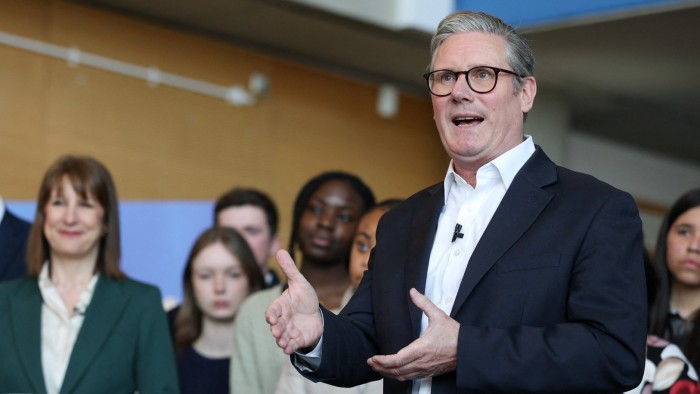Unlock the White House Watch newsletter for free
Your guide to what the 2024 US election means for Washington and the world
Sir Keir Starmer has shifted his focus in US trade talks to cutting the 25 per cent tariff on British cars, admitting he did not know if he could persuade Donald Trump to axe his new 10 per cent tariff on all British imports.
Starmer’s trade strategy was thrown into the air by Trump’s 10 per cent “baseline” tariff, leaving him exposed to claims from political opponents that his attempt to “appease” the US president has failed.
The prime minister, who claims to have built a good relationship with Trump, has not spoken to the US president since tariffs were announced on April 2.
The UK-US “economic partnership” that Starmer has been seeking is yet to materialise. Trump insisted last week that the UK premier was “very happy” with the 10 per cent levy he imposed on imports from Britain.
Starmer’s allies admit Trump and his team have their “eyes elsewhere”, as they face market turmoil and calls from nations hit by much bigger tariffs such as including allies in east Asia.
One British official said it would be “difficult” to persuade Trump to cut the UK’s 10 per cent tariff but added: “When it comes to the 25 per cent on autos, there is more optimism.”
Trump has imposed a 25 per cent global tariff on imported cars and they will significantly affect the UK auto sector. Cars are the biggest single UK export item to the US, accounting for sales worth £6.4bn.
British negotiators are looking again at what they are prepared to offer the US given their previous efforts failed to save the UK from tariffs.
One UK official said: “Our original offer was put on the table when we had no clue what was coming. The Americans want to look at everything again. When the facts change, you look at what that means for everything else.”
Britain had offered to rewrite its digital sales tax — which affects US tech companies — and cut tariffs on some meat and seafood products, while also seeking closer co-operation on tech and artificial intelligence.
UK officials declined to say how the British offer might “change”, but said there was no question of the UK rewriting its Online Safety Act to meet concerns about free speech from the US tech sector.
Starmer, asked on Wednesday by ITV News if he viewed the 10 per cent US levy as permanent, said: “Look, I don’t know. We are negotiating and we hope to improve the situation.”
UK officials said that British trade negotiators were still talking to US counterparts about a trade deal but Starmer’s allies did not expect any imminent breakthrough. One said: “There’s no obvious deadline on the US side.”
People close to Starmer’s allies insist that Britain could have been slapped with a tariff higher than 10 per cent — perhaps the 20 per cent levied against the EU — had it not been for the relationship forged by Starmer with Trump in recent months.
However, Trump imposed his global levies on the basis of a calculation of US trade deficits with each country. Nations with balanced trade relationships, such as the UK, were all hit by Trump’s 10 per cent minimum levy.
“For all the talk about special relationship and good diplomacy, the UK is in exactly the same band of tariffs as the Christmas Islands, The Congo or Kosovo,” said Andrew Griffith, shadow Conservative business and trade secretary. “Not that special.”
Sir Ed Davey, Liberal Democrat leader, told the Financial Times: “Ministers have tried everything to appease Donald Trump — even offering to water down our online safety laws and cut taxes for Elon Musk and other tech billionaires.
“But appeasement never works with bullies and it hasn’t worked with Trump. We have to deal with Trump from a position of strength and that means bringing together our European and Commonwealth allies in an economic coalition of the willing.”
British officials insist that the UK is still “at the front of the queue” to do a trade deal with the US, but Starmer has vowed that it will not be a deal at any price. The domestic political consequences of caving in to Trump’s demands could be significant.
The US president gave an insight into how he views such trade talks on Tuesday when he told a Republican party dinner: “I’m telling you, these countries are calling us up, kissing my ass. They are dying to make a deal.”
To complicate matters, Starmer has already fired his biggest diplomatic shot: conveying a message from King Charles for the US president to travel to Britain for a historic second state visit.
Royal officials said the offer was made in full knowledge of the potential risks and rejected suggestions that the state visit could be scrapped, given the danger of the monarch being drawn into a political row.




